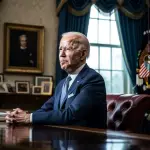In the swirling world of politics, where reality is constantly up for negotiation and truth seems to be as elusive as Bigfoot, the concept of Joe Biden as more of a political brand than an actual person is gaining traction. The whispers from the corridors of power suggest that the administration courtiers might be pulling the strings behind the scenes, with ‘Joe Biden’ merely a figurehead for the larger political agenda at play.
As age catches up with Biden and his well-known stutter continues to present challenges, the idea of using AI to create a smoother, more polished version of the president for public consumption is being floated. This AI-enhanced Biden could potentially sidestep the limitations of his physical self and deliver the administration’s message with precision and efficiency, sparing the president from the rigors of the campaign trail.
My latest at PJMedia VIP. The rise of virtual politics. No human candidates are required for an election between two ideas, both characterized by the same media outlets.https://t.co/G9P1Xkz5Xp
— wretchardthecat (@wretchardthecat) July 9, 2024
The notion of a synthetic politician is not entirely new, with echoes of Orwell’s Big Brother and Emmanuel Goldstein ringing through the air. The clash between Biden and Trump is framed as a showdown between good and evil, with the country's fate hanging in the balance. The American people are urged to choose between a constitutional republic and what is painted as an authoritarian, belligerent alternative.
The vision of a virtual politician controlled by unseen forces raises questions about the nature of politics and representation in the modern age. Are the images of Biden and Trump truly reflective of the individuals themselves, or are they mere symbols manipulated by those behind the curtain? The push towards virtual politics, where algorithms may dictate governmental decisions, blurs the line between reality and fiction, leaving the electorate to grapple with the implications.
As the idea of a synthetic candidate gains momentum, with AI potentially going head-to-head in future elections, the old-fashioned notion of politics rooted in physical reality seems to fade into the background. In this era of smoke and mirrors, where legends and facts intermingle freely, the concept of a genuine, transparent political process becomes increasingly elusive.
Ultimately, the concept of a virtual politician challenges traditional notions of governance and representation, forcing voters to confront the evolving landscape of politics in an increasingly digital age. Whether America will embrace the fantasy election of caricatures or uphold the vision of its founders remains to be seen, as the lines between truth and fiction continue to blur in the political arena.




